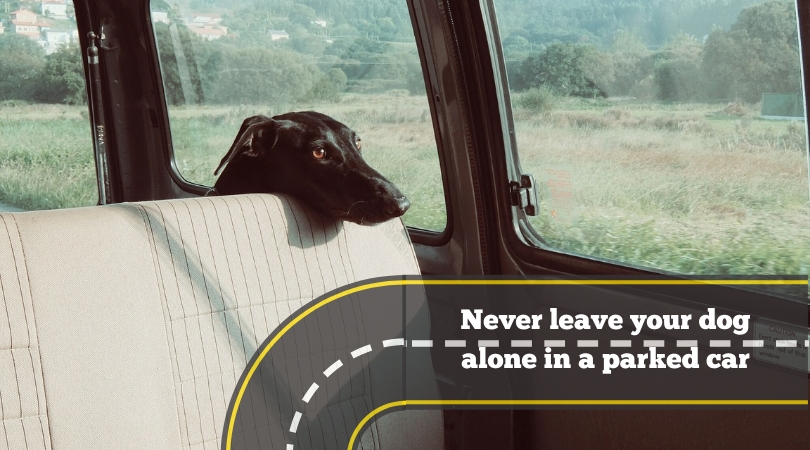Nothing says summer like a road trip. But is your dog ready? Despite the carefree image of a happy dog with his head handing out the window of the back seat, there’s a lot to consider.
For one, is your dog even comfortable in the car? While plenty of dogs are happy to hop into the back seat and go, others are nervous and some even get car sick. Then there’s the safety aspect. It’s not safe for dogs to be loose in the car. Every driver knows they can be a distraction, and distracted driving is dangerous. Some states are even passing laws that pets must be contained either in a pet carrier or with a doggie seat belt.
Then, there are interstate health certificates to consider. Read on for a comprehensive view.
5 Considerations for Car Travel with Your Dog
Planning a pet-friendly road trip requires a little forethought to keep everyone happy, comfortable, and safe. Here are 5 tips for a great road trip with your dog.
1. How Comfortable Is Your Dog in the Car?
Is your dog used to riding in the car? Have you taken him or her on lengthy car rides before? If so, how long ago was it? If your dog’s primary experience with car travel is a short trip to the veterinarian, then a lengthier, unfamiliar route may cause more anxiety than excitement.
You can help them adjust by taking your dog for short jaunts across town that end at different, fun, dog-friendly destinations. Work your way up to trips of an hour or two. If you’re planning a long trip of 5 hours or more, plan your stops. Your dog will want to get out, stretch his legs, and use the facilities, just like the humans in your car. Many rest areas have pup-friendly spaces, but plan on a little extra time there for a walk around with your dog.
For dogs and cats that don't travel well, due to anxiety, our veterinarians can help by prescribing medications that can be used only when needed to ease their angst. Call ahead so you can take them for a "test drive" before the big trip. It may take more than one medication to find the magic formula that works best for each individual.
2. Keep Dogs Secure
Whether you use a well-ventilated carrier or a doggie seatbelt/harness, it’s important to secure your pets. It’s so dangerous to have loose animals in the back seat – or worse, in the front seat with the driver.
You’re probably aware that a loose pet roaming the car can be a distraction, but did you also know that your dog could become a projectile if you were in an accident? Studies show that in case of a 25-mph car accident, your pet can be hurled forward with a force that equates to 40 times its weight. According to Allianz Insurance, “if a car crashes at a speed of 40km/h (25mp/h), an airborne dog can develop projection forces equaling 40 times its weight. For example, a German Shepherd weighing 35 kilos (77 pounds) can impact with a force of 1,400 kilos (3087 pounds).”
Securing your pets in the car is so important that eight states have passed laws requiring doggie harness-style seat belts. This includes New Jersey, Maine, Massachusetts, Minnesota, Connecticut, New Hampshire, Rhode Island, and Hawaii. You don’t drive or ride in a car without a seatbelt; why should your dog?
Don't forget that proper ID tags and a microchip are part of security. In case your dog does happen to get loose, you'll stand a much better chance of being reunited if ID tags and a microchip have your current contact information.
3. Pack a “Doggie” Bag
No, not restaurant leftovers! We're talking about travel needs for your pup. Travel bowls, extra bags for cleanup, leash, food, treats, favorite toys, any medication, bottled water, and a flea and tick comb are all useful.
It’s also a good idea to only feed lightly the day of your trip as dogs with sensitive tummies may not fare well with the excitement of traveling and a full belly.
4. Interstate Health Certificates
It’s not just international travel that has pet health requirements. If you’re crossing state lines, it’s a good idea to bring a copy of your dog’s rabies certification and other health records in case you need them as some states require proof of vaccines and other records. Research carefully when planning your route and destination, then contact us so that we can get a timely start on any needed official health certificates.
5. Never Leave Your Pet Alone in a Parked Car
Every summer, we hear tragic stories about dogs being left in the car too long. It can happen in cold weather, too. But in summer road trip season, what most people don’t realize is how quickly a car can heat up, even on relatively cool days. Imagine a beautiful, 70- degree day - that’s not a temperature most would think was hot. But even in this moderate temperature, a car interior can heat up to 104 degrees within a half hour.

If it’s 80 degrees, it can climb to 130 degrees or more in just a few minutes, and we’re sure you’ll agree, that’s not safe for your dogs.
As you can see, safe car travel with dogs is more than just opening the back door and letting them hop in. We hope these car travel tips have given you food for thought as you plan your summer travels so you have the most fun possible. What about you? Will you take your pets on vacation this summer?
